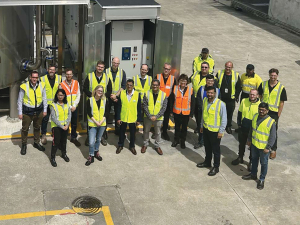Fonterra’s exit from Australia ‘a major event’
Fonterra’s impending exit from the Australian dairy industry is a major event but the story doesn’t change too much for farmers.
 Fonterra’s Palmerston North plant has a unique combination of a commercial heat pump and solar thermal plant to help reduce gas consumption and emissions output.
Fonterra’s Palmerston North plant has a unique combination of a commercial heat pump and solar thermal plant to help reduce gas consumption and emissions output.
Fonterra has launched a unique hybrid emissions reduction solution at its Palmerston North manufacturing site.
The co-op’s first high temperature heat pump and solar thermal plant combination is up and running at Fonterra Brands manufacturing site, where much of the fresh white milk for the North Island is produced.
The heat pump converts excess heat from chillers and compressors into a heat source. This reduces the natural gas required by the site and is expected to remove 495 tonnes CO2e annually – the equivalent of taking 140 cars off the road.
This marks the fourth site within a year to upgrade energy infrastructure to help Fonterra reach its scope 1 and 2 target of 50% emissions reduction by 2030 (from a 2018 baseline).
Fonterra Palmerston North site manager Graham Thomson says the co-op is really excited about this unique combination of a commercial heat pump and solar thermal plant helping reduce gas consumption and emissions output.
The project received co-funding from the Energy Efficiency Conservation Authority’s Government Investment in Decarbonising Industry (GIDI) fund and will help inform future decarbonisation projects at Fonterra.
Fonterra is undertaking a major decarbonisation effort.
It expects to reduce emissions further through a combination of energy efficiency initiatives and switching fuels at six manufacturing sites that still use coal and ultimately stop using coal by 2037.
“We’re in the process of converting the coal boilers at the Hautapu site to wood pellets,” the co-op says.
Once complete, this year, the Hautapu site will reduce carbon emissions by a forecast 15,785 tonnes per annum – the equivalent of taking about 6500 cars off New Zealand’s roads.
The Stirling plant wood biomass boiler has been commissioned, moving the site to fully renewable thermal energy for its process heat. Changing to this boiler will reduce the annual carbon emissions by 18,500 tonnes – the equivalent of taking approximately 7700 cars off New Zealand’s roads.
The new Waitoa wood biomass boiler is now operational and will reduce the site’s annual carbon emissions by approximately 48,000 tonnes, the equivalent of taking approximately 20,000 cars off New Zealand roads.
Fonterra’s impending exit from the Australian dairy industry is a major event but the story doesn’t change too much for farmers.
Expect greater collaboration between Massey University’s school of Agriculture and Environment and Ireland’s leading agriculture university, the University College of Dublin (UCD), in the future.
A partnership between Torere Macadamias Ltd and the Riddet Institute aims to unlock value from macadamia nuts while growing the next generation of Māori agribusiness researchers.
A new partnership between Dairy Women’s Network (DWN) and NZAgbiz aims to make evidence-based calf rearing practices accessible to all farm teams.
Despite some trying circumstances recently, the cherry season looks set to emerge on top of things.
Changed logos on shirts otherwise it will be business as usual when Fonterra’s consumer and related businesses are expected to change hands next month.